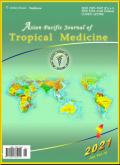Knowledge and awareness of human mpox infection among healthcare workers: A cross-sectional study in southwestern Nigeria
IF 1.6
4区 医学
Q3 PUBLIC, ENVIRONMENTAL & OCCUPATIONAL HEALTH
引用次数: 0
Abstract
Objective: To identify the knowledge and awareness level of human mpox viral infection among healthcare workers in southwestern Nigeria. Methods: A cross-sectional study was conducted in Ekiti State, southwest Nigeria among 316 healthcare workers that were selected through a systematic random sampling. Data were collected with the aid of a semi-structured, self-administered questionnaire. The Chi-square test and binary logistic regression were used to find the association between the independent and dependent variables. The significance level was set at P-value <0.05. Results: Two hundred and twenty-two (70.3%) of the respondents were aged ⩽40 years, mean age (36±9) years, 189 (59.8%) were female, 306 (96.8%) were Christians, and 203 (64.2%) were married. Three hundred and fourteen (99.4%) of the respondents were aware of mpox infection. Main sources of information about mpox were medical education (44.0%), radio/television (32.0%) and newspaper (21.0%). However, among those aware of the disease, 209 (67.0%) demonstrated poor knowledge levels. Longer than 5 years’ experience of medical practice was the only significant predictor of higher knowledge level of the disease (OR 1.76, 95% CI 1.01-3.06; P=0.046). Conclusions: Despite the high awareness level of mpox infection among healthcare workers, there still exists a huge knowledge gap. It is recommended that targeted intervention could be directed towards continuous medical education and simulation exercises on re-emerging infectious diseases like mpox to improve the knowledge of the healthcare workers.卫生保健工作者对人麻疹感染的知识和意识:尼日利亚西南部的一项横断面研究
目的:了解尼日利亚西南部地区卫生保健工作者对人痘病毒感染的知识和认知水平。方法:在尼日利亚西南部的埃基蒂州,通过系统随机抽样,对316名卫生保健工作者进行了横断面研究。数据是通过半结构化的、自我管理的问卷收集的。使用卡方检验和二元逻辑回归来发现自变量和因变量之间的相关性。p <0.05为显著性水平。结果:调查对象中年龄≥40岁者222人(70.3%),平均年龄(36±9)岁,女性189人(59.8%),基督徒306人(96.8%),已婚203人(64.2%)。314名应答者(99.4%)知道m痘感染。mpox的主要信息来源是医学教育(44.0%)、广播/电视(32.0%)和报纸(21.0%)。然而,在了解该病的人中,209人(67.0%)表现出知识水平低下。超过5年的医疗实践经验是对疾病知识水平较高的唯一显著预测因子(OR 1.76, 95% CI 1.01-3.06;P = 0.046)。结论:虽然卫生保健工作者对麻疹感染的认识水平较高,但仍存在巨大的知识差距。建议采取有针对性的干预措施,开展持续的医学教育和关于麻疹等再次出现的传染病的模拟演习,以提高保健工作者的知识。
本文章由计算机程序翻译,如有差异,请以英文原文为准。
求助全文
约1分钟内获得全文
求助全文
来源期刊

Asian Pacific journal of tropical medicine
PUBLIC, ENVIRONMENTAL & OCCUPATIONAL HEALTH-TROPICAL MEDICINE
CiteScore
4.00
自引率
9.70%
发文量
1936
审稿时长
3-8 weeks
期刊介绍:
Asian Pacific Journal of Tropical Medicine (ISSN 1995-7645 CODEN: APJTB6), a publication of Editorial office of Hainan Medical University,is a peer-reviewed print + online Monthly journal. The journal''s full text is available online at http://www.apjtm.org/. The journal allows free access (Open Access) to its contents and permits authors to self-archive final accepted version of the articles on any OAI-compliant institutional / subject-based repository.
APJTM aims to provide an academic communicating platform for international physicians, medical scientists, allied health scientists and public health workers, especially those of the Asia-Pacific region and worldwide on tropical medicine, infectious diseases and public health, and to meet the growing challenges of understanding, preventing and controlling the dramatic global emergence and re-emergence of infectious diseases in the Asia-Pacific.
The journal is proud to have an international and diverse editorial board that will assist and facilitate the publication of articles that reflect a global view on tropical medicine, infectious diseases and public health, as well as emphasizing our focus on supporting the needs of public health practitioners. The APJTM will allow us to seek opportunities to work with others who share our aim, and to enhance our work through partnership, and to uphold the standards of our profession and contribute to its advancement.
 求助内容:
求助内容: 应助结果提醒方式:
应助结果提醒方式:


